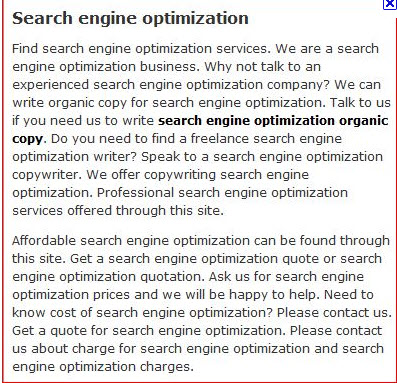What Is The Ideal Keyword Density For SEO Purposes?
 One of the best ways to bring search engine traffic to your site is to develop content for your blog.
One of the best ways to bring search engine traffic to your site is to develop content for your blog.
The more content you have, the more potential your website has for getting found for targeted keywords.
Unfortunately, many webmasters have abused this loophole in the past and as a result many have gotten their websites penalized.
In fact, getting search engine traffic was as simple as writing content around a keyword phrase, including that phrase in the content multiple times and getting backlinks from article directories.
And you could literally be ranking on the first page of Google the next day.
It was that easy.
This was just one of the methods that many webmasters have exploited in order to gain traffic. A popular strategy was to perform basic keyword research and then simply outsource the writing to content farms.
The only problem was that the quality was often very poor.
Poor quality content is problematic for search engines, especially if searchers don’t find what they’re looking for.
Fortunately, search engines have gotten much better at eliminating low quality content. One example is Google’s Penguin algorithm update which aimed to reduce the rankings of those sites engaged in manipulative techniques.
One of these techniques is keyword stuffing or keyword spamming.
How keyword spamming could hurt your rankings
The practice of keyword stuffing is simply repeating the same phrases over and over again.
It can be as simple as using just one phrase such as “search engine optimization” too many times in the text or even stuffing completely with unrelated keywords.
Here’s an example of a poorly written piece of copy:

Can you see why Google would penalize a site like this? It’s no surprise that they do and yet webmasters continue to wonder why their keyword stuffed pages no longer rank.
Pages written like this stand no chance of ranking in the search engines.
The reason?
There’s no value.
Google frowns upon techniques which are meant to manipulate a site’s rankings and keyword spamming is one of them.
The ideal keyword density for SEO
On my post about driving traffic through the long tail, there was a comment about what my suggestions are in regards to keyword density.
Here’s the comment:
I use wordpress and WordPress SEO by Yoast plugin for all SEO tasks. There I see that I can fill the content with 3-4% keyword density. What are your suggestions on it? And how can we fill the content with such density when we are using Long Tail Keywords?
First, keyword density refers to how many times a keyword phrase is used per hundred words.
So if you use the phrase “increase online traffic” fifteen times in an article that has five hundred words, then the keyword density for that phrase would be 3%.
Many webmasters falsely believe that the more times you use a phrase in your content, the better chance it has of ranking.
But this is simply not true.
My opinion? Write a quality post and theme it using relevant keywords.
For a more detailed explanation, watch Matt Cutts’ video about keyword density:
[youtube height=”315″ width=”560″]http://www.youtube.com/watch?v=Rk4qgQdp2UA[/youtube]
The main takeaway is not to worry about getting the right keyword density.
The best approach is to simply write naturally and instead focus on writing quality content.
But what if I have a keyword phrase that I want to rank for?
It helps to have a keyword phrase in mind but it doesn’t mean that you should keyword stuff your copy.
Once you have identified a set of keywords that you would like to rank for, the next step would be to simply write your content without even paying attention to its keyword density.
Of course, there are ways you can optimize your content by including the phrase in the following places:
- Title
- URL
- Image ALT text
- Headings
You should always aim to use relevant phrases and words throughout the text which are related.
Which brings me to my next point.
Theme your content
Your content needs to include certain vocabulary in order to rank highly.
For example, if you write a post about “buying a home” then you will find it extremely difficult to write a well researched article without using worrds such as:
fha loan, buyer tips, affordable lending, credit, mortgage, index, real estate, property, financing, bad credit, buying tips, etc.
To show another example, I did a search in Google for “how to buy a computer” which links to this page.
That page currently ranks number one and it’s easy to see why. It’s a monstrous article and it rightly deserves that ranking.
How many times does the keyword phrase above appear?
Zero.
This article explains in complete detail of what to look for when buying a computer.
Several words are used such as:
CPUs, motherboards, processor, AMD Athlon, Intel Core, high performance, memory, windows, graphics cards, hard drive, monitor, removable storage, communications, operating system, keyboards, etc.
Do you think Google has any trouble guessing what it’s about?
Nope.
I’m willing to bet that this page gets tons of visits through long tail searches too.
That’s the power of theming.
And it’s exactly how sites can get tons of search engine traffic.
Quality matters
Webmasters know they need optimized content to get traffic from the search engines. However, even a completely optimized piece of content is no guarantee that it will rank.
There are also other factors involved such as how relevant the content is, how many links it has, how trustworthy the domain is, how many social shares it is, etc.
For example, that same article above about buying computers may not rank so highly if it were placed on a completely unrelated domain.
Another factor too is the quality in which the content is written.
Although quality is certainly subjective, search engines are getting much better at delivering exactly what a searcher is looking for.
How?
By using various indicators such as backlinks. An article that receives backlinks from authority websites stands to benefit tremendously through increased rankings.
Another factor is social media. This interesting social media case study by Media Bistro stated the following after their results:
“We believe… that certain promotional social media activities bear a causal link to increased search engine rankings.”
Quality cannot be stressed enough.
You can pay for dollars per article and put them on your website but your website may suffer in the form of reduced rankings or worse, get hit by search engine penalties.
Save yourself the trouble.
Hire a qualified SEO copywriter
To succeed online, you need an online presence.
But you also need an SEO copywriter. One who understands how to write engaging content and one who knows how to write copy that brings targeted traffic from the search engines.
Hire me today to find out what I can do to help take your business to the next level by implementing a strategy that works.



Leave a Reply
Want to join the discussion?Feel free to contribute!